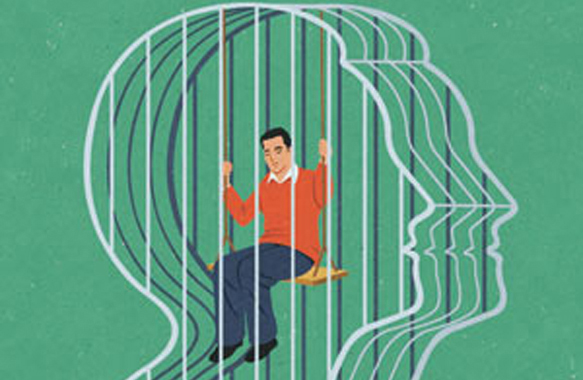Even those of us who aren’t religious tend to rely on some notion of a soul.’ Illustration: John Holcroft for the Guardian. Click on picture for full frame
Are they both essentially the same thing, asks Oliver Burkeman
In the 1988 comedy Big, you may recall, a 12-year-old boy is transported into the body of Tom Hanks – a nightmarish twist on Kafka’s Metamorphosis, in which the protagonist gets off comparatively lightly by being transported into the body of a giant beetle. Neither story’s believable, of course, but as the psychologist Paul Bloom points out, what’s interesting is that they don’t strike us as meaningless, either: on some level, we can imagine how it might feel to wake up in another body. That’s because most of us are what philosophers call “dualists”: intuitively, we think of mind and body as two different entities, neither reducible to the other. What this means, in practice, is that even those of us who aren’t religious tend to rely on some notion of a soul. After all, “waking up in someone else’s body” only makes sense if the “real you” is distinct from your body. Even the phrase “your body” is sneakily dualist: who’s the “you” to which the body belongs?
Brain scientists find this dualism frustrating, since to most of them it’s obvious that somehow – even if nobody knows how yet – everything that happens in the mind must arise from the spongy grey tissues of the brain. (This is “physicalism”, the opposite of dualism.) Still, you’d be entitled to dismiss this as philosophical navel-gazing with little bearing on real life: dualism, physicalism, who cares? Or at least you would if it weren’t for a fascinating study by researchers at the University of Cologne, to be published in Psychological Science, who concluded that dualism might be a rather unhealthy way to live.
Their hunch was that dualists, deep down, think of their bodies as husks – containers for their “real” selves – and thus treat them with less respect than physicalists, who think of their bodies as themselves. Sure enough, people primed to think in a dualist way (by reading a short text making the case for dualism) proved significantly less keen to endorse statements such as “I limit the amount of fat I eat” and “I regularly go to the gym” than those primed for physicalism. Asked to pick a cookbook as a reward for participating, dualists were more likely to choose one on desserts or barbecue than vegetarian or organic food. It worked in reverse, too: making people think about health foods made them less dualist.
A few weeks back, this column reported evidence that which language you speak might affect your self-discipline, but most of us aren’t going to learn Mandarin to take better care of ourselves. The optimistic implication of the German research, though, is that merely re-examining your philosophical assumptions might coax you into better shape.
Much of our thinking on happiness, actually, relies on a hidden dualism. Faced with some problem of the mind – depression, anxiety – the “natural-born dualists” assume the solution must lie on the level of the mind, too. Exercise might give them a boost, but they tend to assume it can’t be a real solution to such woes; that has to come from therapy, meditation, or other “psychological” work. Yet who says so? Talk of the “mind-body connection” is often dismissed as new-age quackery, but if physicalism’s right, mind and body are more than just connected: they’re essentially the same thing. If I were a dictator, page one of every self-help book would read, in bold, inch-high capitals: “FIRST, GO FOR A SWIM.”
• oliver.burkeman@guardian.co.uk; twitter.com/oliverburkeman












Leave A Comment